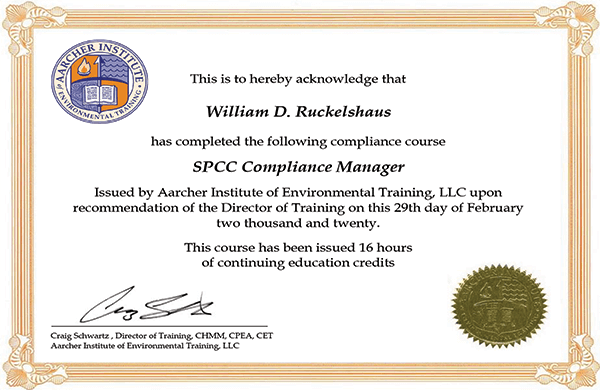Our 2-Day SPCC training course prepares you to effectively develop Spill Prevention, Control & Countermeasure (SPCC) plans and manage compliance for your facility.
Manage SPCC compliance with confidence.
Facilities subject to SPCC regulations must develop and effectively implement SPCC plans. Those challenged with achieving compliance with this regulatory program must understand applicable requirements well beyond the basic regulatory language of 40 CFR 112. Because facilities differ in terms of oil storage and site configuration, SPCC planning is intentionally flexible, but that flexibility also presents risks of improper oil discharge prevention planning and regulatory compliance. Current interpretations, agency guidance, and practical on-the-ground applications pose a challenge to both new and experienced environmental professionals.
Prepare plans, implement plans, monitor compliance, prepare for inspections.
Re-developed for 2021, this course has guided students through their SPCC regulations for nearly 20 years. Participants immerse themselves in requirements applicable to oil storage, including tank features and design; tank integrity inspections; secondary containment design, condition, and inspection; required facility features; plan contents and updates; and all other provisions of this important and actively enforced regulatory program.
Who should attend this course?
The SPCC Compliance Manager™ course is deigned for those responsible for developing an SPCC plan, reviewing or approving a plan, or managing compliance with an existing plan.
- Licensed profession engineers (PEs) who will review and certify SPCC plans must attest that they are “familiar with the requirements” of the SPCC regulations per 40 CFR 112.3(d)(1)(i). This course satisfies that requirement for engineers new to these regulations or that require a refresher.
- Preparers of self-certifying Qualified Facility SPCC plans must certify that they are familiar with the applicable SPCC requirements per 40 CFR 112.6(a)(1). This course satisfies that requirements for Qualified Facility plan preparers.
- All oil-handling personnel at SPCC facilities are required to receive annual training in applicable pollution control laws, rules and regulations per 40 CFR 112.7(f)(1). This course supports this annual training requirement.
- Anyone responsible for implementing an SPCC plan or maintaining overall SPCC compliance will also benefit from this course.
What is the course format?
SPCC Compliance Manager™ is presented as a series of topical modules in a logical sequence. Each module is designed to foster open class discussion to explore the finer points of these requirements. Class exercises are used to break up the day and apply new information to real-life scenarios, including evaluations and critiques of facility SPCC plans.
Relevant handouts, including SPCC inspection checklists, are provided to help you understand what inspectors are looking for and how you can evaluate facility compliance.
Students are encouraged to bring copies of SPCC plans to class, if available, so the plans can be reviewed by classmates and the instructor as part of the class. The result is a valuable action plan for improving the plan or simplifying plan implementation.
What does this course deliver?
You will leave the course prepared to take on the preparation of SPCC plans and management of SPCC compliance programs. You will understand the practical application of these regulations at a facility level and be prepared for agency compliance inspections. Course binder and handout materials form useful references for your continued use, and you will have the instructor’s contact information for any future questions.
At completion of the course, you will receive a certificate for your records.
